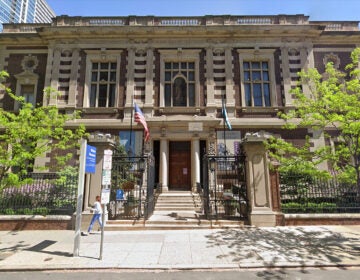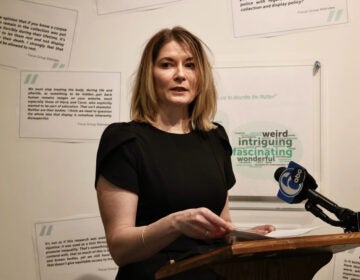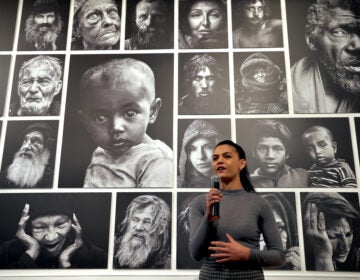Mütter Museum’s executive director tries to chart new paths despite criticism
Philadelphia's famous Mütter Museum of medical history started a national controversy in 2023 by removing all online exhibits and videos.
Listen 7:28
Kate Quinn, executive director of the Mütter Museum. (Courtesy of the College of Physicians of Philadelphia)
From Philly and the Pa. suburbs to South Jersey and Delaware, what would you like WHYY News to cover? Let us know!
In January 2023, Kate Quinn, the executive director of Philadelphia’s storied Mütter Museum, asked her staff to take down all online exhibits and YouTube videos, to permit the museum to conduct an ethical review of its entire collection. The move came as museums across the country grappled with how to handle human remains.
That month, ProPublica and the Philadelphia Inquirer published stories about how U.S. schools and museums were slow to return remains belonging to Native Americans as required by federal law.
With its tagline “disturbingly informative,” the Mütter Museum is known for its darkly fascinating collection of medical specimens, which includes an eight-foot-long colon, pieces of Einstein’s brain, and a variety of tumors in jars. Quinn’s order to remove online materials caused confusion and uncertainty, and wrought immediate consequences.
For one, students in the museum’s after school programs use the virtual exhibits and materials for projects. Now, education staff had to scrap those plans without a clear idea of what was wrong with the exhibits, and what they could or could not use, said Victor Gomes, who was coordinating a program at the time.
“There was … this kind of uncertainty and … people trying to sort of guess at what the problems are,” he said.
He wondered if he could use the exhibits that arrived more recently to the museum and provided detailed documentation about the origins and consent of specimens, but he did not get any answers. Gomes said he had to change the programs after he had already guided students through them for a semester, without being able to tell them why. The student projects ended up not using any videos of the museum’s exhibits, just to be on the safe side.
“The students were very clearly bummed. I was bummed too,” Gomes said. “That felt really bad for me as an instructor to … have to… sprint to try to work around all of this and ultimately do worse by the kids in my opinion,” he said.
Gomes claims his supervisors couldn’t answer any of his questions about the content, nor could they get clear answers from people above them when they asked. He said the museum’s then-CEO Mira Irons never responded to his questions via email, and neither Irons nor Quinn were available to talk in person.
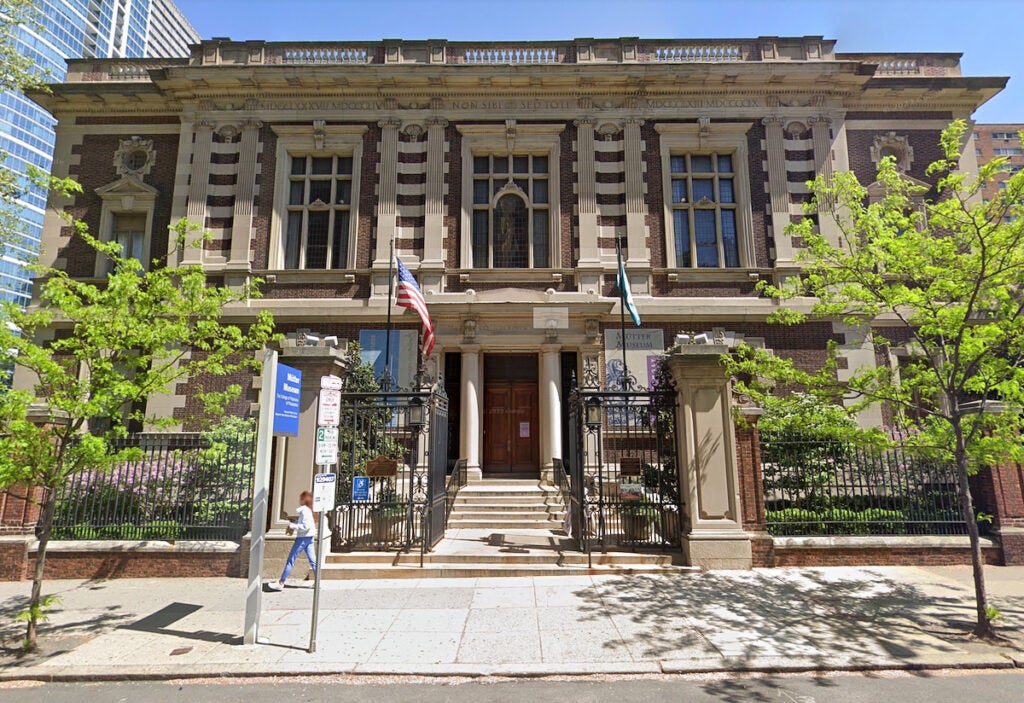
Exhibit disappearance causes a stir
Some people quickly noticed that the museum’s online exhibits were gone, like Robert Pendarvis, who had donated his own heart to the Mütter Museum after receiving a new one through an organ donation. He wanted more people to learn about acromegaly, a rare medical condition with which he is diagnosed. He conducted video interviews with museum staff and regularly uses those videos to explain his condition to medical staff. The video of his heart donation is gone, though last year, Quinn said his heart is still on display in the museum.
Pendarvis emailed the museum to ask for an explanation, and that inquiry led to a staff meeting with Quinn and Irons, the museum’s then-CEO. During that meeting, Irons said she couldn’t stand to walk through the museum, which shocked staff.
Quinn said she and other museum leaders decided to take down videos and online exhibits without input from staff.
“Not every decision involves everyone … when it’s made,” she said. “We did have a meeting in the director’s office where folks could opt in to come in and talk to us about it and tell us what they thought and they did.”
Quinn says making decisions — even if they’re unpopular — is part of her job.
“I was hired by a CEO to move forward as a leader and leaders have to take action. And so that is something that I’m sure is not met with wide open arms from everyone, I know that to be true, but it’s my obligation.”
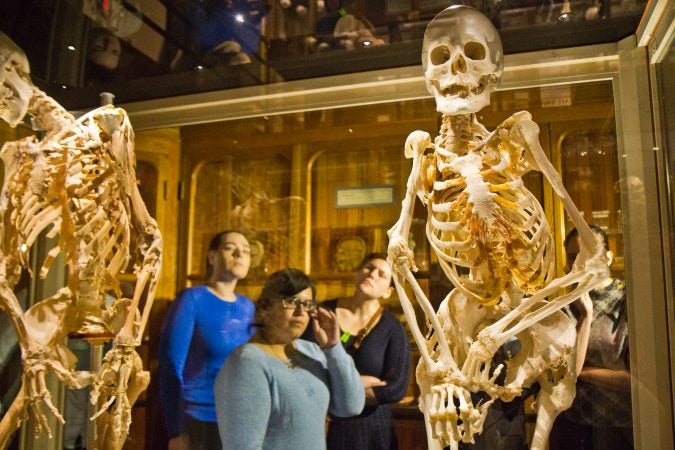
Creating change during times of reckoning
Beyond the questions over human remains and how they should be displayed, there’s a broader discussion about the future of the museum, and what its role should be. The museum recently held the first of several planned town hall meetings to get feedback on that question.
Quinn says the public feedback will guide the museum, but she has a specific vision: The museum should focus on current issues. “Draw attention to and help people work through issues that are facing Philadelphians today, tell a story about public health and about medicine,” she said, adding that might mean a different selection of displays and exhibits.
“The collection is about 35,000 objects, and if we include the library’s collections, there’s another half million materials,” she said. “Each and every piece can tell a story in its own way and I like to say that any one object can tell you 100 stories. You just have to coax these stories out of the objects.”
In the meantime, the museum has restored some, but not all of their YouTube videos to their channel. For instance, the video of Pendarvis’ heart is still not on the channel. The museum no longer has online exhibits, but does have a searchable database of their collection.
For some of Quinn’s critics, her push to change the Mütter’s look and approach is the big issue; for others, it’s more the way she goes about making these changes.
Taking the reins
Before Quinn came to the Mütter Museum in September 2022, she led the Penn Museum, and the Michener Art Museum in Doylestown, Pennsylvania. At all three places, her leadership has drawn both criticism and praise, based on conversations with more than 10 of her current and former colleagues, on and off the record.
During her first nine months in charge of the Mütter Museum, more than 10 people quit. Quinn says only two of those people reported to her and they left for better jobs. An advocacy group called “Protect the Mütter” formed, and one of their demands is for Quinn to go. The museum’s relatively new CEO, Mira Irons, resigned.
And even before the discussion over human remains at the Mütter blew up at the start of 2023, there had been internal questions about Quinn’s leadership and communication style.
Nancy Hill had been an employee at the museum for years, starting in 2016. She started working with museum visitors, and moved on to working on the exhibits themselves. She said the museum had a close, tight-knit team that worked well together, but that changed when Quinn became executive director.
As an example, she cited a planned exhibit on the art of forensics that the Mütter Museum was going to organize with an anthropologist from the University of South Florida. After one meeting, Quinn was not happy with the exhibition proposal, Hill recalled.
“She basically said, ‘I don’t think that this meets the mission of our institution,'” said Hill. “And I said, ‘okay, tell me how it doesn’t … can you point out to me where the shortfalls are?'”
“She says, ‘I just don’t see how it serves the mission.'”
Hill explained how she thought it did serve the mission, and asked for what she should change in future proposals. She and Quinn went back and forth, and ultimately, Hill said Quinn would neither explain why the proposal fell short, nor would she give an example of what a successful proposal would look like. She recalled Quinn saying the Mütter should meet the standards of the Wellcome Collection in London, a much larger museum with a bigger budget.
“It was like pulling teeth to get any usable information out of her,” Hill said.
When asked about this incident, Quinn recalled the situation differently. She said she “asked the team to strengthen the proposal so that it was better connected within the mission of the college and they never came back to me with anything more.”
The anthropologist in Florida told the Philadelphia Inquirer that Quinn was afraid there would be negative publicity. Hill was frustrated, and ultimately quit in November 2022. She told the board that she was leaving primarily because of Quinn’s conflicting instructions that “are setting staff up for failure.” She’s one of several people who quit after Quinn became executive director.
But Quinn does have supporters. Shirley Choi was an administrative assistant at the library of the College of Physicians of Philadelphia, which runs the Mütter Museum, before she left in February 2023. She said after Hill left, Quinn became more proactive about talking to staff one-on-one.
“She would come into the library more. She would like just walk around and say, ‘hey, what’s up? What are you working on?'” Choi said. “I feel like she was trying to get better.”
Choi said some of the problems that staff had with Quinn came down to miscommunication.
“She comes off as like a little aggressive in her way of communicating. She’s very blunt. She doesn’t sugarcoat her words.”
Choi also said Quinn is in a difficult position of having to take instructions from the CEO and board of the College of Physicians of Philadelphia. Choi said it’s an “open secret” that the board does not like the museum.
Leading cultural institutions
Before Quinn joined the Mütter, she was executive director of the Michener Art Museum for a little less than two years.
When Quinn joined the Michener in 2020, independent curator David Leopold had already agreed to work with the museum to organize an exhibition. He had cleared most of the details with museum staff before Quinn arrived. He has worked with museums across the country on exhibits for years, including several for the Michener.
But he said when Quinn came on in 2020, she either would not respond to emails or phone calls to work together in a timely manner, or made last minute changes without any discussion.
“We made decisions, it seemed like a very normal thing, and then a couple of weeks later I hear that, ‘no, no we can’t do those things because Kate doesn’t like it.'”
He said her staff had trouble with her as well.
“They seem to always be looking over their shoulder because they didn’t know what this sort of mercurial director would be deciding on that day.”
One example he cited is her decision to take away a wall from the show he worked on, three weeks before the public debut, despite him already having gone over all those details with museum staff to make sure everything was handled properly.
He detailed his complaints in a 25-page report to the board with recommendations. Quinn left the Michener a few months after that. She said it was because the contract ended.
Heike Rass was in charge of marketing at the Michener until September of 2023, and said she has the complete opposite opinion of Quinn. She joined shortly after everything that happened with Leopold.
“She’s a very qualified executive director,” Rass said, adding that Quinn greatly improved the Michener Museum during her tenure.
“She was very conscious and very conscientious about being professional … in every respect that you can be, and as much as some people wanted not to be so professional.”
The Michener Museum declined to comment on a personnel matter.
As to her time at the Penn Museum, former staff member Jesse Engaard told Philadelphia Magazine that Quinn was both ambitious and harsh.
“She would humiliate employees in front of everyone and would not tolerate opposing opinions,” Engaard told reporter Malcolm Burnley. “Her goal was just to get visitors in the door to please the higher-ups and further her career.”
That does not describe Quinn as Richard Hodges knew her. He was director of the Penn Museum from 2007 to 2012 and during that time, promoted her to become head of exhibitions.
When it comes to someone who can manage a U.S. museum in a “commonsensical way,” he said Quinn is “as good as you’re damn well going to get.”
He said Quinn calmly led her team during a stressful time in 2011, when the Chinese government suddenly decided to pull some artifacts from a planned exhibit on the Silk Road, ultimately relenting in the end.
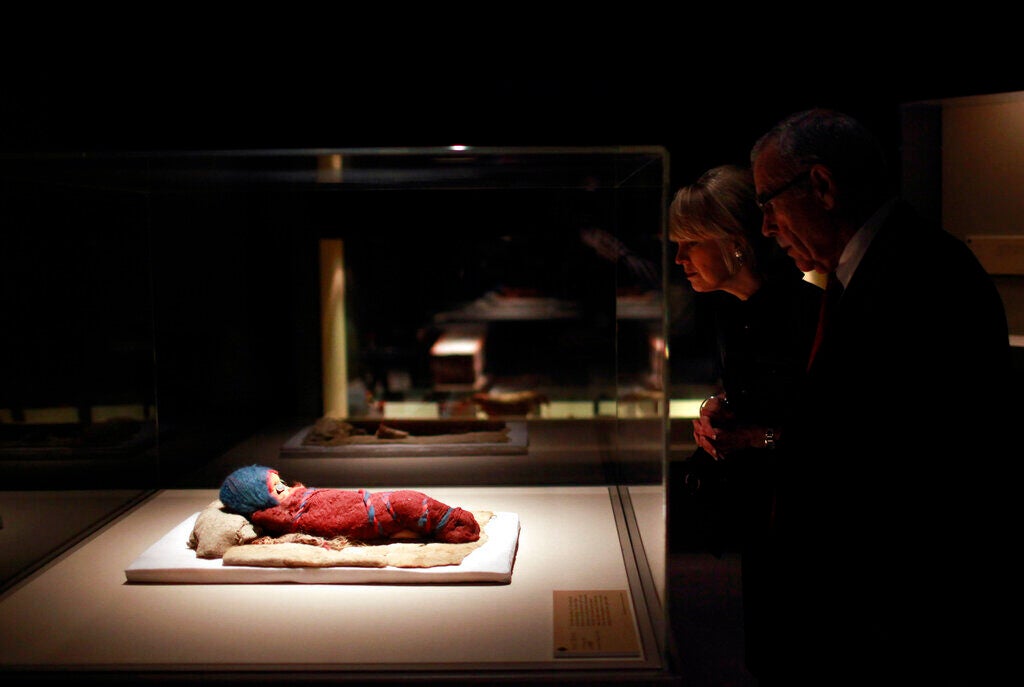
What’s next for the Mütter?
In September 2023, Mira Irons, the CEO of the College of Physicians of Philadelphia and the person who hired Quinn, resigned. The college hired an outside human resources firm to interview staff in response to complaints about Quinn’s leadership. She says she embraces the idea and fully supports the firm and their recommendations. The museum will continue holding town hall meetings to gather public feedback.
Editor’s note: The headline and subheads of this story have been updated as well as clarifying details about Robert Pendarvis’ heart donation and the Mütter Museum’s online catalog and YouTube channel. The original story was published on Jan. 11, 2024. After incorporating edits, it was republished on Jan. 13, 2024.

Get daily updates from WHYY News!
WHYY is your source for fact-based, in-depth journalism and information. As a nonprofit organization, we rely on financial support from readers like you. Please give today.




